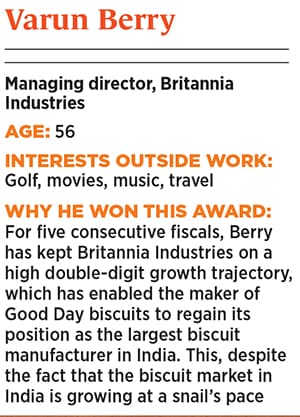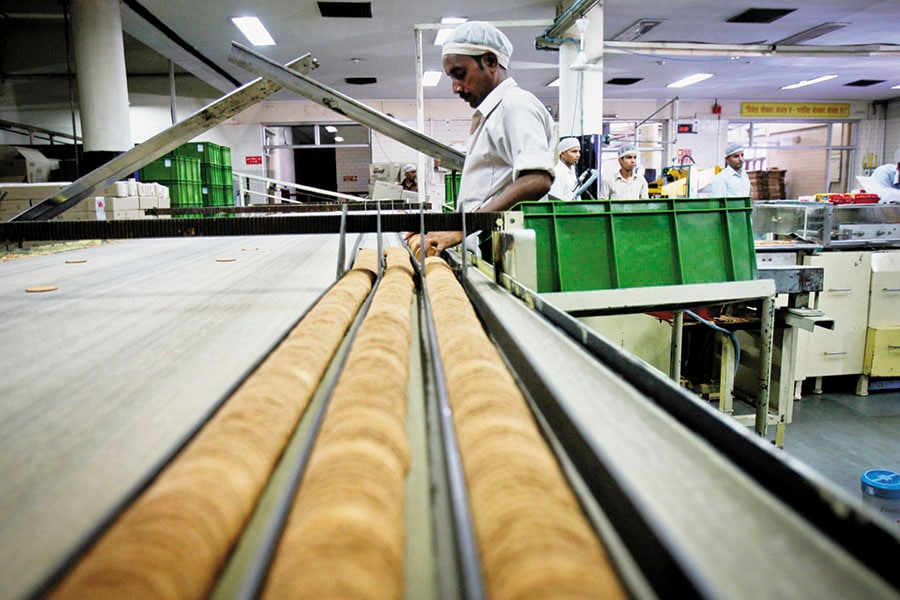
Britannia's Varun Berry: On the ball
While Britannia Industries continues its surge in market share, under the hood there has been a visible change in the work culture at the 125-year-old biscuit maker, thanks to the company's managing director Varun Berry
 Image: Nishant Ratnakar for Forbes India
Image: Nishant Ratnakar for Forbes India
Forbes India Leadership Awards 2017: Best CEO-Private sector
At the head office of the ₹8,600-crore biscuit maker Britannia Industries in Bengaluru, news about the company’s employees—who’s happy, who’s sad or even who’s planning to leave—reaches the ears of Managing Director Varun Berry at lightning speed. “He gets people-related information much faster than me,” quips Ritesh Rana, vice president, human resources, at Britannia Industries, who goes on to cite an example.
In September, Berry had asked Rana to retain two senior employees who he believed or, rather, had a hunch, were going to quit. These two staffers were not direct reports of Berry and neither had any of them given any indication about their intention to quit. “You need to watch out for these two guys. We will have to do something here otherwise they are gone,” Rana recalls Berry telling him. The intuition came to be prophetic—one of them actually ended up resigning. He was retained with a new job profile within the company. The other employee, too, was looked after, though he had not officially resigned.

Berry’s people skills come up often when one talks to the senior management at Britannia Industries. And, in fact, even outside the company. “He builds strong personal relationships and invests time and effort to sustain them,” says his former boss Muktesh Pant—first at Hindustan Lever (HUL) and then at PepsiCo India. “At Britannia he [Berry] has demonstrated his ability to build a team and deliver results,” adds Pant, CEO, Yum China Holdings, Inc, the Chinese arm of Yum! Brands, which owns and operates the global restaurant chains KFC, Pizza Hut and Taco Bell.
He recollects an incident when he and Berry, who was then a young manager at tea maker Brooke Bond (part of HUL), went on a field visit. “Varun was in his element, talking to shopkeepers and being at the frontline. I knew then that he would go far—he was able to connect instantly with shopkeepers and senior managers, speaking in a sophisticated or rustic way as required,” recalls Pant. “Varun has a disarming sense of humour and can remain unruffled in the toughest of circumstances. He is a natural and complete leader.”
In fact, Berry, 56, a graduate in mechanical engineering from Panjab University, himself says, “My greatest achievement has been on people.” But it is far more than people skills and retaining good talent—Berry has been at the forefront of changing the work culture at the 125-year-old Britannia Industries, which has been reflecting in the company’s business performance ever since he took over in 2013.
*********
An FMCG industry veteran—having worked for 18 years at PepsiCo in various countries —Berry has had a track record of tightening the nuts and bolts of a company and effecting turnarounds. He is credited for helping establish PepsiCo as a formidable brand in markets such as Vietnam and Philippines, in the capacity of chief operating officer and chief executive officer of the company’s regional offices, respectively.
When Berry joined Britannia Industries in February 2013 as vice president and chief operating officer—in April 2014 he was elevated as managing director—rival Parle Products had a three to four percentage point lead over the company in market share, in value terms. Berry put in place various strategies, one of which was to rapidly increase the company’s distribution reach in a bid to regain lost ground and today, Britannia enjoys a three percentage point lead over Mumbai-based Parle Products, commanding a little over 31 percent share in India’s ₹28,000-crore biscuit market. (From a volume standpoint, Parle Products is bigger given that it has a higher share in the mass-market glucose biscuit category.)
Britannia Industries’ growth over the last five consecutive fiscals speaks volumes of Berry’s achievements. The company’s revenue has grown at a CAGR of 11 percent between FY13 and FY17, while its profit has reported a 5-year CAGR growth of 38 percent. Profit margins have increased by 10 percentage points from 4 percent to 14 percent in the same five-year period. The biscuit maker’s 5-year revenue and profit CAGR from FY09 to FY13 was 12.42 percent and 5.25 percent, respectively.
It’s interesting to note here that while the biscuit category overall in the country has been growing in low single digits, Britannia has been able to report an impressive set of revenue and profit growth figures. In fact, up until 2012, the biscuits market was growing at a scorching pace of 15-16 percent, in some years at even 22 percent. “If the category growth was what it used to be, then our growth could have been in the region of 25 to 30 percent per annum,” says Berry. “That’s something I feel handicapped by.”

Image: Adnan Abidi /Reuters
Nonetheless, given the performance, investors have been bullish on the company’s stock—its share price has surged from ₹578.25 in April 2013 to ₹4,645.3 in October 2017. As a result, the company’s market capitalisation has increased to ₹40,488 crore from ₹6,275 crore.
“Berry is a rare breed, he has solid leadership skills and is strong strategically and operationally,” says a company insider who did not wish to be named. Britannia, he says, has grown significantly in all three dimensions under Berry’s leadership—topline, bottomline and market share—which is “a unique achievement in the FMCG industry”.
A significant part of Britannia Industries’ success story can be credited to a series of cost-cutting initiatives, some of which had been set in motion before Berry had joined the company. These range from making sure the company’s ovens, which are used to bake biscuits, are more energy efficient to drastically reducing supply chain costs and curbing high market returns by better sales forecasting metrics. A back-of-the-envelope calculation by Berry estimates that of the 10 percentage point rise in the company’s profit margins, about 6.5 to 7 percentage points can be attributed to the company’s cost-cutting initiatives.
“We had completed a fairly comprehensive and rigorous cost-effectiveness programme and developed a robust growth blueprint and roadmap across the value chain,” says Vinita Bali, the former managing director of Britannia Industries. The programme’s implementation, especially in the context of benign input costs over the last three years, says Bali, has resulted in the company’s profit margin expansion. “Unlike CEOs who like to tinker with strategy and people, he [Berry] has stuck to both, focusing on execution and that has worked very well,” says Bali of her successor.
Berry’s people skills come up often when one talks to the senior management at Britannia or outside the company
Indeed the plans needed someone with strong execution skills and Berry has proved to be the right man for the job. As the company insider points out, “He got the right team in place, significantly increased points of distribution, delivered a better value proposition to consumers, optimised the product, price and channel mix, brought consumer-relevant innovation to the market, improved product quality, drove productivity gains and managed costs tightly.”
Ali Harris Shere, vice president, marketing, at Britannia, emphatically says that Berry is the architect of getting the company’s business to “a very healthy zone”. The other significant achievement of Berry, says Shere, is that he has built a cohesive team within Britannia that has helped deliver business results. “Collaboration within the team, working together, that is something he has been at aggressively for a very long time,” says Shere.
*********
When Berry joined Britannia Industries, the then prevalent company culture, according to him, was ‘We are Britannia, we rule the world’. The company neither looked at what competition was doing nor did it change strategy based on what competition did. As an example, Berry narrates how Britannia had lost a whopping 55 percentage point share in the premium cream biscuits category where its brands Pure Magic and Britannia Bourbon operate. Oreo (by Cadbury) and Sunfeast Dark Fantasy (by ITC) had taken away a huge share of the market.
“They left us a very small share of 25 percent, which was also predominantly because of Bourbon. Pure Magic had almost become inconsequential to our business,” recalls Berry, adding that the cream biscuits category was about ₹600 crore in revenue for Britannia back then.
According to him, people in Britannia had justified the market share loss, stating that nothing was wrong with the company’s products and the blame was put on the high media spends by competitors Cadbury and ITC. What frustrated him more was the fact that the various departments within the company worked in silos. “This is my domain and I’m going to just make sure that this works well,” was the culture Berry came across.
He, however, had a different work culture in mind, which was: “The objective of the organisation is not just to look at your own domain, but also the objective is to sell that one extra biscuit in the market.” In a nutshell, Berry wanted every employee of Britannia Industries, whatever be their functional role—finance, supply chain, sales or marketing—to work towards ensuring how best the retailer on the street can sell an extra pack of the company’s biscuits.
Gunjan Shah, a company veteran for 10 years, says that “bias for action” was the first change in work culture that Berry ushered in. “He brought in a competitive edge, he worked with people, solved problems, found new solutions and, more importantly, implemented them,” says Shah, vice president, sales. The problems that Berry solved, adds Shere, were broken down into simple, small, defined units that were actionable.
Moreover, Berry had the ability to spot talent and the strengths not only of people directly reporting to him, but also of those who were many levels below his direct reporting team. “He has the ability to understand what is the right way to extract the best potential out of that individual,” says Shah. “He places trust in you and then backs you up. He sometimes will put you under fire to get tested, but is also there to take you out of it,” adds Rana.
Berry has also been hands-on in grooming his direct reports, which comprise a 12-member team that includes Shah, Rana and Shere. “There was a lot of pressure in the initial days because I was spending a lot of time grooming them to get to a much bigger job than what they had done or even anticipated,” admits Berry. His direct reports are, on an average, about 10 years younger than him. While some of them joined the company over the last five years from other industries, a majority of them are old hands who have been promoted. “He has put a premium on talent as compared to experience,” says Shah, while agreeing that it’s a sea change in the work culture at Britannia Industries.
Another change that Berry is effecting, but one that would take a little longer to materialise, is putting Britannia Industries on the path of being a total foods company. At present, biscuits are Britannia’s core business, accounting for about 80 percent of its total revenue. But Berry sees big opportunities in other categories such as cakes and croissants, and is also planning for a larger play in the dairy business. Britannia Industries’ dairy business, which includes products such as milk, cheese, ghee and curd, accounts for about 4 to 5 percent of the company’s overall revenue. And all of its dairy products are contract manufactured. However, Berry is seeking board approval to establish a fully integrated dairy business, whereby the company would collect milk, process it and manufacture its own dairy products.
Further, Berry got Britannia Industries to sign a joint venture (JV) partnership with Greek bakery company Chipita in February this year. The JV, in which Britannia owns a 60 percent stake, will market chocolate-filled croissants, among other flavours, that would be manufactured from a new facility in Maharashtra to be set up at a cost of ₹200 crore. “I’m really looking forward to this category [of croissants], which is in a sweet spot. I could have croissants for breakfast, when I’m in a hurry or just as a snack between meals. I think this is a category which is going to be very large and I’m seeing that trend in many countries,” says Berry, adding that the croissant market in Egypt, where Chipita also operates, is worth $300 million.
So while the last five years have been about streamlining the business and changing the work culture, Berry’s focus now is on future strategies. Which is: What are the future growth drivers for the company, what are the kinds of business lines the company should be in, what are the collaborations and partnerships the company needs to make in order to pursue those business lines, and, importantly, what is the talent required to drive these strategies?
Bob Proctor, who is considered America’s greatest prosperity teacher, says that a mentor is someone who sees more talent and ability within you than you see in yourself, and helps bring it out in you. Berry has already been on that job.
(This story appears in the 30 November, -0001 issue of Forbes India. To visit our Archives, click here.)




